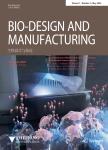Constructing a biofunctionalized 3D-printed gelatin/sodium alginate/chitosan tri-polymer complex scaffold with improvised biological andmechanical properties for bone-tissue engineering
作者机构:Centre of Excellence in Tissue EngineeringDepartment of Biotechnology and Medical EngineeringNational Institute of TechnologyRourkela 769008India
出 版 物:《Bio-Design and Manufacturing》 (生物设计与制造(英文))
年 卷 期:2024年第7卷第1期
页 面:57-73页
核心收录:
学科分类:0831[工学-生物医学工程(可授工学、理学、医学学位)] 081702[工学-化学工艺] 08[工学] 0817[工学-化学工程与技术] 0805[工学-材料科学与工程(可授工学、理学学位)]
基 金:The authors are thankful to Ministry of Human Resource Development(presently Ministry of Education) Government of India New Delhi for providing research facility by sanctioning Center of Excellence(F.No.5-6/2013-TS VII)in Tissue Engineering and Center of Excellence in Orthopedic Tissue Engineering and Rehabilitation funded by World Bank under TEQIP-II.
主 题:Scaffold Biomaterial Sodium alginate Chitosan Gelatin 3D printing Tissue engineering
摘 要:Sodium alginate(SA)/chitosan(CH)polyelectrolyte scaffold is a suitable substrate for tissue-engineering application.The present study deals with further improvement in the tensile strength and biological properties of this type of scaffold to make it a potential template for bone-tissue regeneration.We experimented with adding 0%–15%(volume fraction)gelatin(GE),a protein-based biopolymer known to promote cell adhesion,proliferation,and differentiation.The resulting tri-polymer complex was used as bioink to fabricate SA/CH/GEmatrices by three-dimensional(3D)printing.Morphological studies using scanning electron microscopy revealed the microfibrous porous architecture of all the structures,which had a pore size range of 383–419μm.X-ray diffraction and Fourier-transform infrared spectroscopy analyses revealed the amorphous nature of the scaffold and the strong electrostatic interactions among the functional groups of the polymers,thereby forming polyelectrolyte complexes which were found to improve mechanical properties and structural stability.The scaffolds exhibited a desirable degradation rate,controlled swelling,and hydrophilic characteristics which are favorable for bone-tissue engineering.The tensile strength improved from(386±15)to(693±15)kPa due to the increased stiffness of SA/CH scaffolds upon addition of gelatin.The enhanced protein adsorption and in vitro bioactivity(forming an apatite layer)confirmed the ability of the SA/CH/GE scaffold to offer higher cellular adhesion and a bone-like environment to cells during the process of tissue regeneration.In vitro biological evaluation including the MTT assay,confocal microscopy analysis,and alizarin red S assay showed a significant increase in cell attachment,cell viability,and cell proliferation,which further improved biomineralization over the scaffold surface.In addition,SA/CH containing 15%gelatin designated as SA/CH/GE15 showed superior performance to the other fabricated 3D structures,demonstrating its potential for use in bone-tissue engineering.



